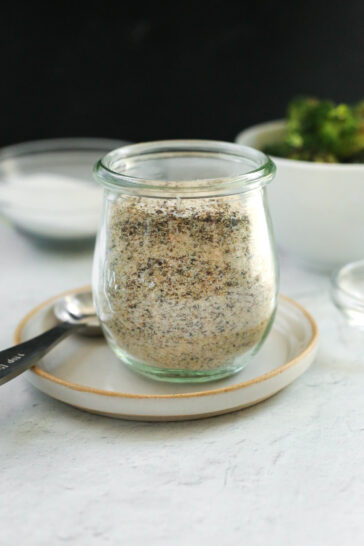As a dietitian, I’m always answering multiple questions about the validity of vitamins and supplements.
And it’s fair to question, considering the enormous amounts of money invested in the research, formulation, manufacturing, and marketing of these products. According to Statista, there was over $30 billion in revenue in vitamins and nutritional supplements industry in 2018, and it’s projected to increase by over $1 billion next year. When surveyed, most people share their motivation to take supplements is for overall health and wellness.
Is it working?
If you want the TL;DR version, here it is: the science is a little shaky. Though there might be some benefit for some people in some situations, for the most part, money or effort spent on vitamins and supplements might be better invested elsewhere for improving health.
I’m not here to split hairs or debate the data (I do enough of that in my day job as a dietitian).
Rather, I got curious about the appeal of personalized nutrition and the factors that determine whether someone pursues, and maintains, a regimen of custom-tailored vitamins and supplements.
What’s the Appeal of Personalized Nutrition?
In short, we want to feel special.
Gone are the days of a one-size-fits-all approach. While grabbing a bottle of multivitamins tablets off the shelf at the drugstore could probably get the job done, that’s so 2003. Multivitamins have been around for nearly a century at this point. You likely remember growing up with the bottle of Centrum Silver or Flintstone tablets or fruit-flavored gummies in the medicine cabinet. After that, there were the colorful pill packs from the likes of GNC and other mass retailers, boasting a gender-specific combination of essential nutrients.
Now, we have endless options. We can purchase subscriptions for personalized formulations and get them delivered to our doorstep. We can gulp down a superfood shot in liquid form, promising to deliver half of our recommended fruits and veggies. We can pour powders into our smoothies and replace any of our meals and snacks with food-like substances that claim to provide what we need.
It’s just so damn easy. We no longer have to diligently plan meals, fill the gaps, think as hard about getting the recommended amounts of every nutrient under the sun.
Outsourcing this oversight to a personalized nutrition startup seems to be a logical next step for the time-poor, cash-rich American who wants an insurance policy for a future of good health.
Is this space fully saturated, or are we only seeing the beginning of this trend towards premium, highly personalized products?
How Do You Get Started With Personalized Vitamins?
It’s getting easier and easier to play the game. I spent a few minutes going through the onboarding surveys for some of these new companies and it’s like a virtual choose-your-own-adventure story. You can select your health concerns or lifestyle goals and respond to a series of questions designed to hone in on the formulation that’s optimal for you. I paused before sharing my email address because God knows I get enough emails as it is, but that didn’t stop the sophisticated algorithms from targeting ads to all of my social media accounts.
The process may seem simplistic but it’s actually quite complex. Startups sink untold amounts of money into developing the best user experience and yielding the best results based on the responses we provide. At this point, we have a good foundation for AI in medicine and healthcare. The algorithms are more sophisticated than ever but the answers they spit out are only as good as the questions being asked. They still can’t replace the human element of talking to a real-life, in-the-flesh healthcare provider.
The irony is although that’s what we often need, it’s rarely what we get.
Healthcare is starving for time. Physicians and other providers are bound to the model that relies on turning patients the way a restaurant turns tables, operating on volume to curb costs and stay profitable. Since our physicians don’t have the time to ask us these questions and referrals to allied health professionals are rarely covered by insurance, it can feel good to receive that attention from a screen, as skewed as that perception may be.
We crave the feeling of being seen, attended to, cared for.
We want to be involved in the process and have some say in the outcome. So perhaps what these personalized assessments are offering is not better outcomes, but simply an invitation to participate.
Is Better Health One of Your Values?
Living in alignment with our values is one of the factors that drives our behaviors. Another factor at play is our self-identity and how we perceive our actions in relation to our overall health. In American culture, we see many examples of how health is used to indicate value or worth; as screwed up as that is, it’s easy to see based on how quick we are to judge habits that seem somehow “less than” or unhealthy.
Consider for a moment your visceral, gut reaction to the following habits:
- Eating highly processed food instead of cooking meals from scratch at home
- Drinking soda instead of water
- Living a sedentary lifestyle or avoiding opportunities to get active
- Skipping healthcare appointments or a yearly physical
- Waiting it out instead of getting medication for an illness
There are many more, but taken out of context, it would seem someone doing any of the above doesn’t care about their health. If we assume we value our health more, we suddenly feel superior. Anyone who doesn’t want to admit that is either lying or somehow immune to the cultural messages we’ve received since birth.
On the flip side, there are also examples of aspirational behaviors. These are things we feel obligated to do in the name of good health. Who among us wouldn’t want to be uplifted and revered for their dedication?
Consider how you would feel if you or someone engaged in the following habits:
- Purchasing fresh fruits and veggies
- Consistent meal planning and prepping
- Getting good quality, restful sleep every night
- Dedicating time, energy, or resources to personal or professional development
- Maintaining an active lifestyle
…and, of course, taking vitamins or supplements.
I’m willing to bet you’d assume the person performing the second set of habits would have better health. And yes, over a lifetime, that’s likely true. But in the case of vitamins and supplements, it really boils down to this:
We like the idea of being the type of person who can prioritize health and wellness and invest in our wellbeing. We want to buy into the notion that we can take control and have the bandwidth to say, “Yes I am healthy, just look how hard I’m working to achieve that.”
Let me pause for a moment to say there is nothing inherently wrong about this.
As I mentioned, we’re conditioned to believe this is part of life, that if we have the ways and means of securing good health, we’re obligated to do so. But where I take issue with this “health halo” effect is when it creates a social hierarchy or enforces the idea that health is equivalent to morality.
There’s even a term for this: healthism. It’s highly problematic and needs to be addressed internally, externally, and on the institutional and systemic levels. It contributes to weight stigma, bias, and fat discrimination.
It’s uncomfortable to think the years, dollars, and effort sunk into personalized nutrition may have been misguided. I’m not saying that’s the case for each and every person, but in my experience as a registered dietitian, I often see other opportunities to make deeply impactful and long-lasting changes that have nothing to do with vitamins and supplements.
Would Personalized Vitamins Be The Best Change For You?
In any thorough nutrition assessment, dietitians and other healthcare providers should be looking at overall lifestyle in a number of different areas. Nutrition doesn’t exist in a vacuum. We don’t eat nutrients, we eat food.
If there is an apparent gap in nutrition or suboptimal intake of a key nutrient, food may offer a better solution than turning to a pill or supplement. But sometimes we need a catalyst for other healthful behaviors. Here’s where I think vitamins and supplements show their true value. It might set off a domino effect.
Taking a vitamin might not move the needle. There are always exceptions, but the average person eating a diet with a variety of foods and adequate energy is not likely to develop a deficiency disease or wind up severely malnourished.
However, if you’re reminded to get active, go to bed on time, eat nourishing foods, and so on each time you reach for your daily dose of nutrition, that’s a net positive. The big health shift comes from first, your mindset, and second, the compounding of other factors.
There is an immense amount of privilege wrapped up in being able to invest in your health to this degree. There is an expense associated with everything, and it takes a certain level of affluence and societal privilege to even think about dedicating resources to something like taking daily vitamins.
It’s clear they aren’t going anywhere. The market will continue to grow, more startups will enter the space, and existing brands will expand their offerings to gain a competitive edge. It’s a billion-dollar industry for a reason, so just keep these things in mind next time you’re preparing to swipe your card or sign up for the latest and greatest subscription service.
Stay skeptical but don’t be afraid to experiment with personalized vitamins. I can’t determine if you feel better taking a supplement or not —you’re the expert of your body. If you realize after three to six months there’s no change, maybe it’s not worth the continued investment.
You can also ask yourself if you would continue with your current regimen (assuming health remains unchanged) if there was no one to bear witness to your actions. Are you opting into a personalized nutrition plan because you know it changes your health for the better?
Or are you simply trying to perform to the standards of our culture’s unwavering obsession with wellness?













